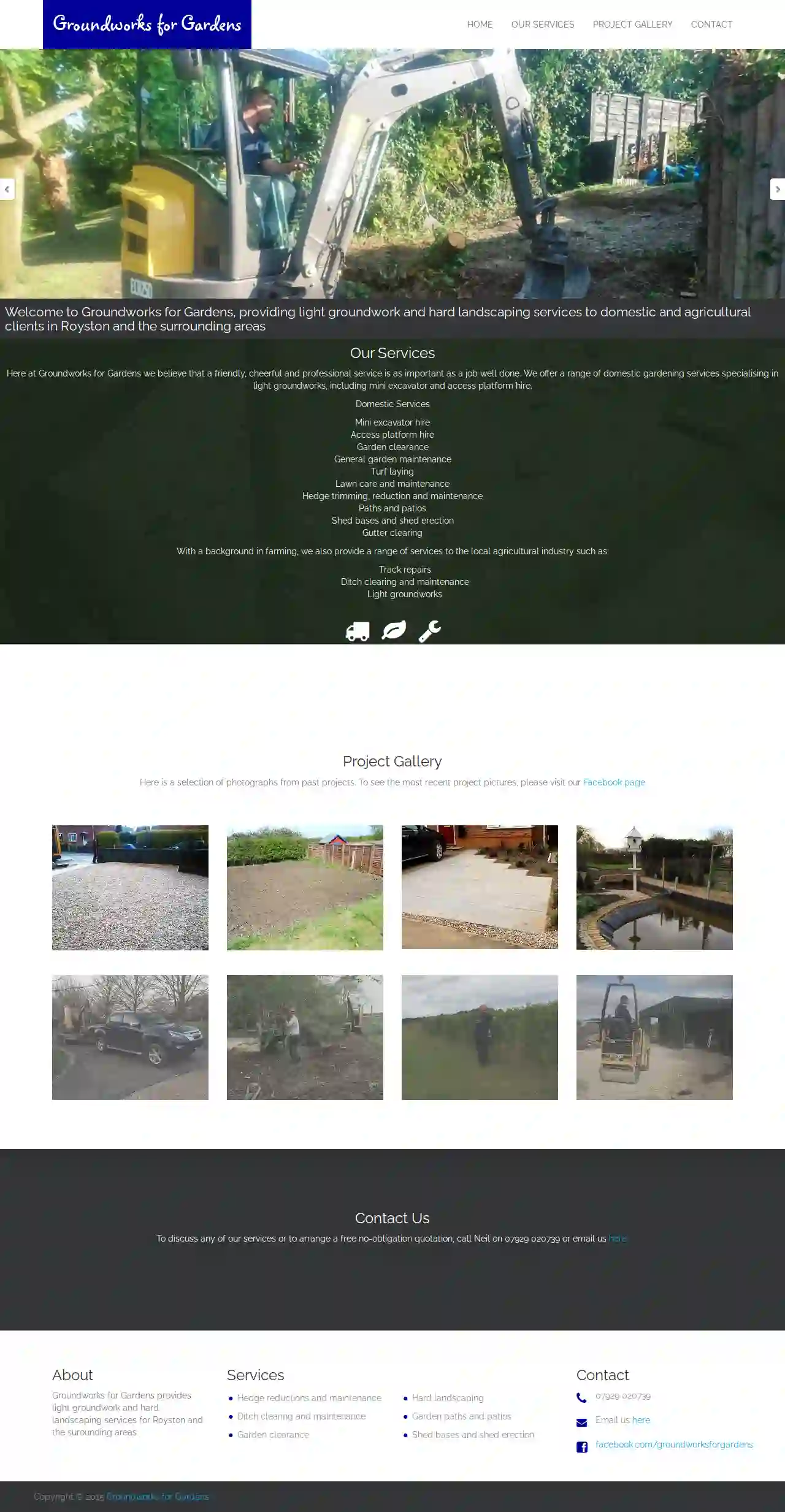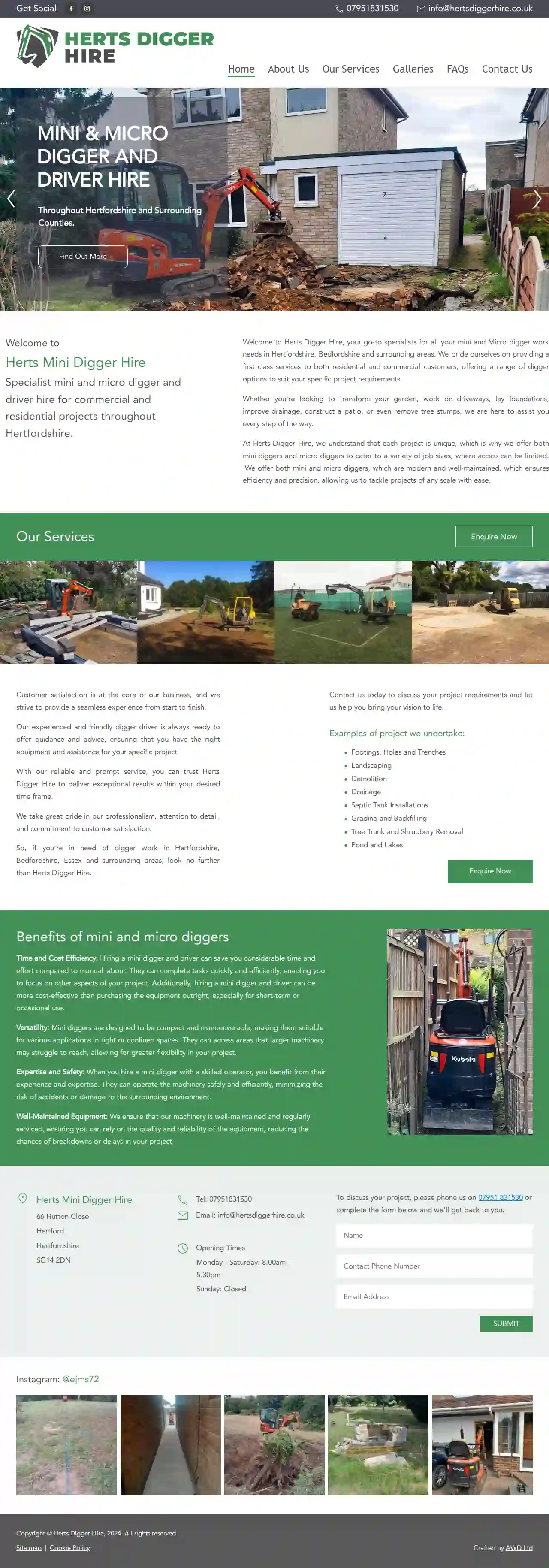Excavation Contractors Hoddesdon
Top 10 Digging Contractors in Hoddesdon
Receive up to 3 Excavation Services quotes for your project today! Compare profiles, reviews, accreditations, portfolio, etc... and choose the best deal.
- S
S R McHugh
4.85 reviewsHertford, GB- Services
- Why Us?
Get Quote - H.
H. E. Services (Plant Hire) Ltd
55 reviewsStevenage, GB- Services
- Why Us?
Get Quote 
Groundworks for gardens
56 reviewsHertford, GBWelcome to Groundworks for Gardens Groundworks for Gardens provides light groundwork and hard landscaping services for Royston and the surrounding areas. We believe that a friendly, cheerful and professional service is as important as a job well done. We offer a range of domestic gardening services specialising in light groundworks, including mini excavator and access platform hire. With a background in farming, we also provide a range of services to the local agricultural industry such as track repairs, ditch clearing and maintenance, and light groundworks.
- Services
- Why Us?
- Gallery
Get Quote
DBacon and Son LTD
1Hertford, GBWelcome to DBacon And Son LTD Quality Comes First Our family-run construction company has been synonymous with unwavering quality, integrity, and a deep-rooted commitment to craftsmanship. With a reputation that starts from a family working together, we have built our values on a foundation of trust and an enduring passion for construction. With this long-established presence in the industry, it has allowed us to foster enduring relationships with clients, subcontractors, and suppliers. This network of trust enables us to consistently deliver projects of exceptional quality, on time, and within budget. As a well-respected name in the field, we take immense pride in our ability to bring dreams to life, whether it's creating a dream home, revitalizing a community space, or constructing a commercial landmark.
- Services
- Why Us?
- Gallery
Get Quote
Oval Construction - House Extensions Hertfordshire | Loft Conversions | Kitchen Renovations
53 reviewsOval Construction, Letchworth Garden City, England, SG6 2NZ, GBOval Construction: Your Trusted Partner for Building & Maintenance in Hertfordshire Oval Construction is a leading provider of quality building and maintenance services in Hertfordshire, with over 25 years of experience. We are based in the heart of Letchworth Garden City and proudly serve Stevenage, Hitchin, and the surrounding areas. Our expertise lies in a wide range of services, including loft conversions, full house refurbishments, house extensions, kitchen renovations, and bathroom renovations. We are committed to delivering exceptional results by employing fully qualified and insured tradespeople. Our dedicated team covers a wide range of services, including painting, carpentry, bricklaying, plumbing, electrical work, tiling, plastering, and groundwork. We are dedicated to providing efficient, cost-effective solutions tailored to your needs. From start to finish, we prioritize superior craftsmanship and attention to detail, ensuring your complete satisfaction. Contact us today to transform your home with precision and expertise.
- Services
- Why Us?
- Gallery
Get Quote
Herts Digger Hire
55 reviewsHerts Mini Digger Hire, 66 Hutton Close, Hertford, SG14 2DN, GBHerts Digger Hire: Your Go-To for Mini and Micro Digger Services in Hertfordshire Welcome to Herts Digger Hire, your trusted partner for all your mini and micro digger needs in Hertfordshire, Bedfordshire, and surrounding areas. We've been serving both residential and commercial customers since 2005, building a reputation for quality, reliability, and customer satisfaction. We understand that every project is unique, which is why we offer a range of modern and well-maintained mini and micro diggers to suit your specific requirements. Whether you're transforming your garden, working on driveways, laying foundations, improving drainage, constructing a patio, or removing tree stumps, we've got you covered. Our experienced and friendly digger drivers are always ready to offer guidance and advice, ensuring you have the right equipment and assistance for your project. We pride ourselves on our prompt and reliable service, delivering exceptional results within your desired timeframe. At Herts Digger Hire, we're committed to: Providing a first-class service to both residential and commercial customers. Offering a range of digger options to suit your specific project requirements. Ensuring efficiency and precision with our modern and well-maintained equipment. Delivering exceptional results within your desired timeframe. Prioritizing customer satisfaction and providing personalized solutions. Contact us today to discuss your project requirements and let us help you bring your vision to life.
- Services
- Why Us?
- Gallery
Get Quote- He
Herts Electrical Contractors Ltd
1Hertford, GB- Services
- Why Us?
Get Quote - JC
JCM Groundworks
4.73 reviewsStevenage, GB- Services
- Why Us?
Get Quote - Vi
Vines Construction Ltd
529 reviewsStevenage, GB- Services
- Why Us?
Get Quote - Ha
Hadleigh Construction
1Hertford, GB- Services
- Why Us?
Get Quote
Over 11,537+ Excavation Companies onboarded
Our excavation providers operate in Hoddesdon & beyond!
ExcavationHQ has curated and vetted the Best Excavation Businesses arround Hoddesdon. Find a top & trustworthy contractor today.
Frequently Asked Questions About Excavation Contractors
- Project Size and Scope: Larger, more complex excavations naturally take longer.
- Soil Conditions: Rocky or challenging soil types can slow down progress.
- Site Accessibility: Limited access might require more time for maneuvering equipment and hauling materials.
- Weather: Inclement weather can cause delays.
- Permitting and Inspections: Waiting for permits or inspections can extend the timeline.
- Clearly Define the Scope: Outline the project's goals, including the excavation area, depth, grade, and intended use.
- Obtain Necessary Permits: Research and acquire any required permits from your local authorities.
- Mark Utility Lines: Contact your utility companies to locate and mark underground utilities to prevent damage.
- Communicate with Neighbors: Inform your neighbors about the project's timeline and potential noise or disruptions.
- Prepare the Site: Clear any obstacles, such as vegetation, furniture, or structures, from the excavation area.
- Discuss Safety Protocols: Review safety procedures with the contractor to ensure a safe work environment.
How long does an excavation project take?
What is the difference between cut and fill excavation?
Cut: Involves excavating soil from an area where the existing grade is higher than the desired grade.
Fill: Refers to using the excavated soil ('cut' material) to raise the grade in an area where the existing grade is lower than desired.
This method minimizes the need to import or export soil, reducing costs and environmental impact. It's commonly used for site preparation, road construction, and landscaping.
What should I do before excavation starts?
What is the difference between topsoil and subsoil?
Topsoil: The uppermost layer, typically rich in organic matter, nutrients, and microorganisms. It's essential for plant growth and is often darker in color.
Subsoil: The layer beneath the topsoil, containing less organic matter and generally denser. It provides support for roots but is less fertile than topsoil.
During excavation, topsoil is often removed and preserved separately for later use in landscaping, while subsoil is typically used for backfilling or other less demanding applications.
How long does an excavation project take?
- Project Size and Scope: Larger, more complex excavations naturally take longer.
- Soil Conditions: Rocky or challenging soil types can slow down progress.
- Site Accessibility: Limited access might require more time for maneuvering equipment and hauling materials.
- Weather: Inclement weather can cause delays.
- Permitting and Inspections: Waiting for permits or inspections can extend the timeline.
What is the difference between cut and fill excavation?
Cut: Involves excavating soil from an area where the existing grade is higher than the desired grade.
Fill: Refers to using the excavated soil ('cut' material) to raise the grade in an area where the existing grade is lower than desired.
This method minimizes the need to import or export soil, reducing costs and environmental impact. It's commonly used for site preparation, road construction, and landscaping.
What should I do before excavation starts?
- Clearly Define the Scope: Outline the project's goals, including the excavation area, depth, grade, and intended use.
- Obtain Necessary Permits: Research and acquire any required permits from your local authorities.
- Mark Utility Lines: Contact your utility companies to locate and mark underground utilities to prevent damage.
- Communicate with Neighbors: Inform your neighbors about the project's timeline and potential noise or disruptions.
- Prepare the Site: Clear any obstacles, such as vegetation, furniture, or structures, from the excavation area.
- Discuss Safety Protocols: Review safety procedures with the contractor to ensure a safe work environment.
What is the difference between topsoil and subsoil?
Topsoil: The uppermost layer, typically rich in organic matter, nutrients, and microorganisms. It's essential for plant growth and is often darker in color.
Subsoil: The layer beneath the topsoil, containing less organic matter and generally denser. It provides support for roots but is less fertile than topsoil.
During excavation, topsoil is often removed and preserved separately for later use in landscaping, while subsoil is typically used for backfilling or other less demanding applications.